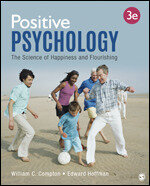The global spread of coronavirus and nationwide lockdowns mean that, for the time being, many of us are getting used to a new way of life. The resources below are to help us all stay well during the pandemic.
Instructor Resources
Positive Psychology - The Science of Happiness and Flourishing
Access free materials that are geared toward increasing your effectiveness with this material and maximizing the potential for your students to learn.
Articles from Social Science Space
How Researchers, Instructors, And Students Can Practice Wellbeing During The COVID-19 Pandemic
Published on April 14, 2020 By Olivia Butze
Social and behavioral research suggests many ways to calm your anxiety and practice well-being during this time of many unknowns. SAGE Publishing, the parent of Social Science Space, has opened various resources to support not only your own emotional health, but also the health of those around you, such as your children, students, and colleagues.
Why Call It ‘Social Distancing’? We Need Social Connection More Than Ever
Published on March 27, 2020 By Katharine H. Greenaway, Alexander Saeri And Tegan Cruwys
Staying socially connected in times of threat has benefits beyond helping us manage our mental well-being. Other people can provide us with practical support, like picking up groceries or passing on relevant information, as well as emotional support. This feeling is called social solidarity, and if we get it right we’ll be much better equipped to respond to this and other crises.
How To Stay Connected In A Time Of Physical Distancing
Published on March 23, 2020 By Jonathan Kanter And Adam Kuczynski
Psychological scientists at the University of Washington’s Center for the Science of Social Connection draw from their clinical and research experiences help us understand the side effects of social distancing and suggest strategies for addressing them.
Resources for Students, Lecturers, Teachers and Parents
Maintaining positive mental health and wellbeing
In this page, we share free resources on mental health and wellbeing to support the education community as we navigate this difficult time together. Whether you are studying at home, teaching remotely, facilitating home schooling or leading and managing your staff, we hope it offers some useful support in ensuring you look after yourself as well as those within your care or responsibility in the weeks ahead.
Mental Wellbeing During Social Distancing
As we've entered uncertain times, it's easy to become overwhelmed. David Mair, author of The Student Guide to Mindfulness, has kindly put together some helpful tips to support any students who may be stressed by the current situation, whether isolated as universities close, or worrying about studying and assignments.
Managing Stress
University can be the best time of your life. Freshers, new friends, independence, eating out, unplanned lay-ins. The list goes on and on. However, there is another side to this new found freedom: deadlines, exams, bills, and a new environment. This list also goes on and on. Sometimes it’s challenging to balance the two sides, and this can lead to an unhealthy level of stress. But don’t panic – here you’ll find top tips, activities and reading material to encourage a healthier and peaceful state of mind while you’re getting your degree.
Be Well, Stay Well, Study Well
Some may think that university is a time of glorious freedom and fun. While there certainly is the possibility for these, let’s face it – newfound freedom can have its share of difficulties and a unique set of stressors. It can be challenging to try to lead a balanced and healthy lifestyle at a time when structured school bells and nutritious home cooking seem far, far away.
Mastering Academic Writing
Many students struggle with academic writing skills. From the basics of grammar and punctuation and sourcing and referencing material, to developing an argument and correctly structuring an essay or assignment, there are common mistakes even confident students make. Here we share a collection of top tips, advice and guidance to help you develop and master academic writing at university.
Referencing Made Easy
Reference – citation – source – bibliography: all these terms can strike fear into the heart of students. Correct referencing is essential in academic writing and research, not only to guard against plagiarism but to acknowledge your sources, demonstrate your knowledge about a topic, give your argument authority, and enable readers to find out more. Let’s clear up some confusion over what it is and how to do it, with these top tips and tools to make referencing assignments easy.
Developing Critical Skills
The answers you get depend on the questions you ask. But how do you know you’re asking the right questions? Critical thinking is a key skill required at university, whether at undergraduate level or postgraduate. This page shares a range of advice and guidance on how to build skills and confidence in critical thinking, reading and writing, helping you develop a reflective and critical approach to your research and writing.
Report and Dissertation Writing
The first step in your report or dissertation is always the idea. This may be provided to you in the form of a statement from your lecturer or you may be asked to tackle something of your own creation. It's always important to understand what the statement is inferring as it's this understanding that'll inform your research.
Revision and Exam Preparation
Many people find examinations difficult and some underachieve. However, examination candidates can improve their performance by developing a range of appropriate techniques including systematic revision methods alongside working on mental attitudes before their exam. Check out our tips and resources to get you in the best mindset to help you ace your exams...














